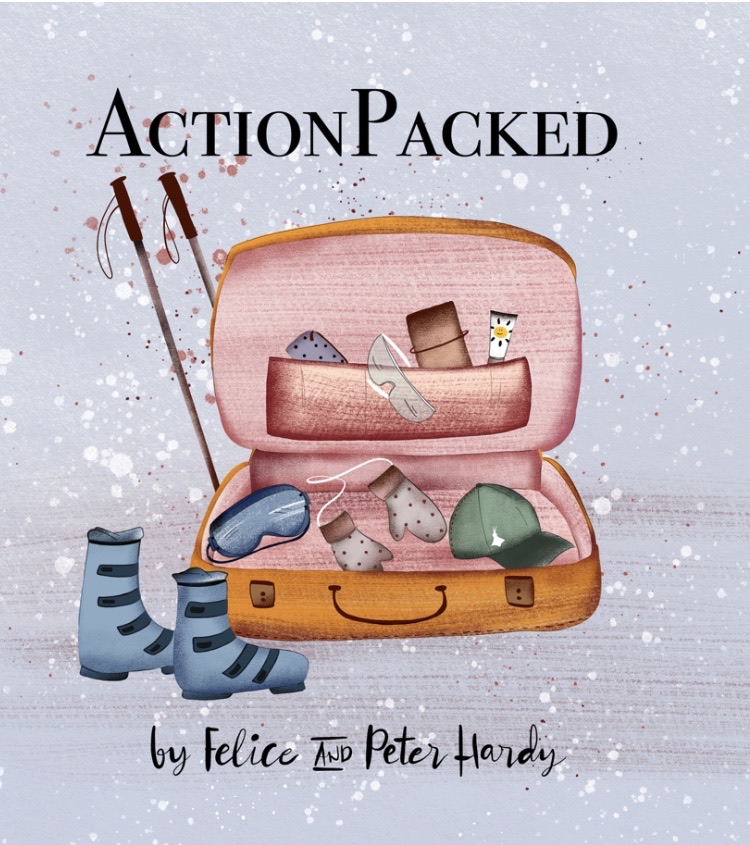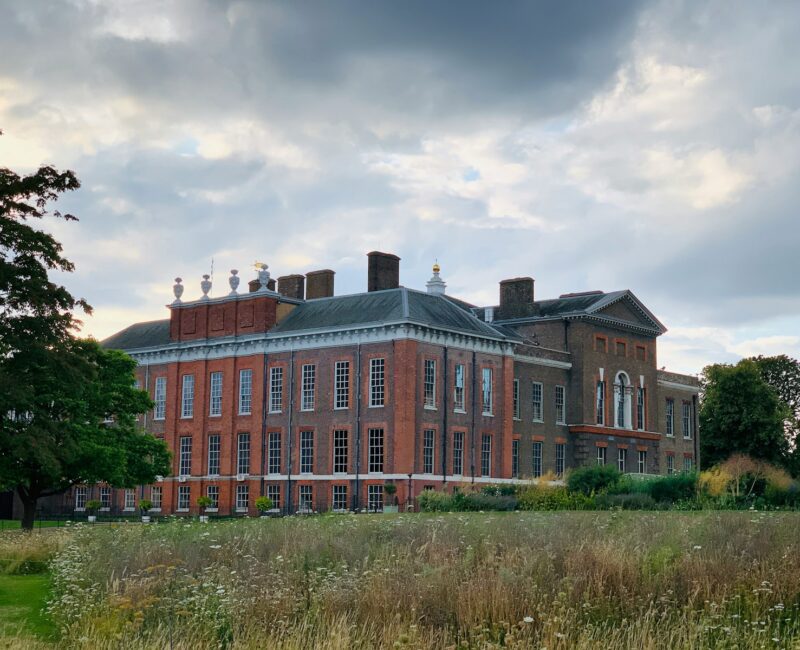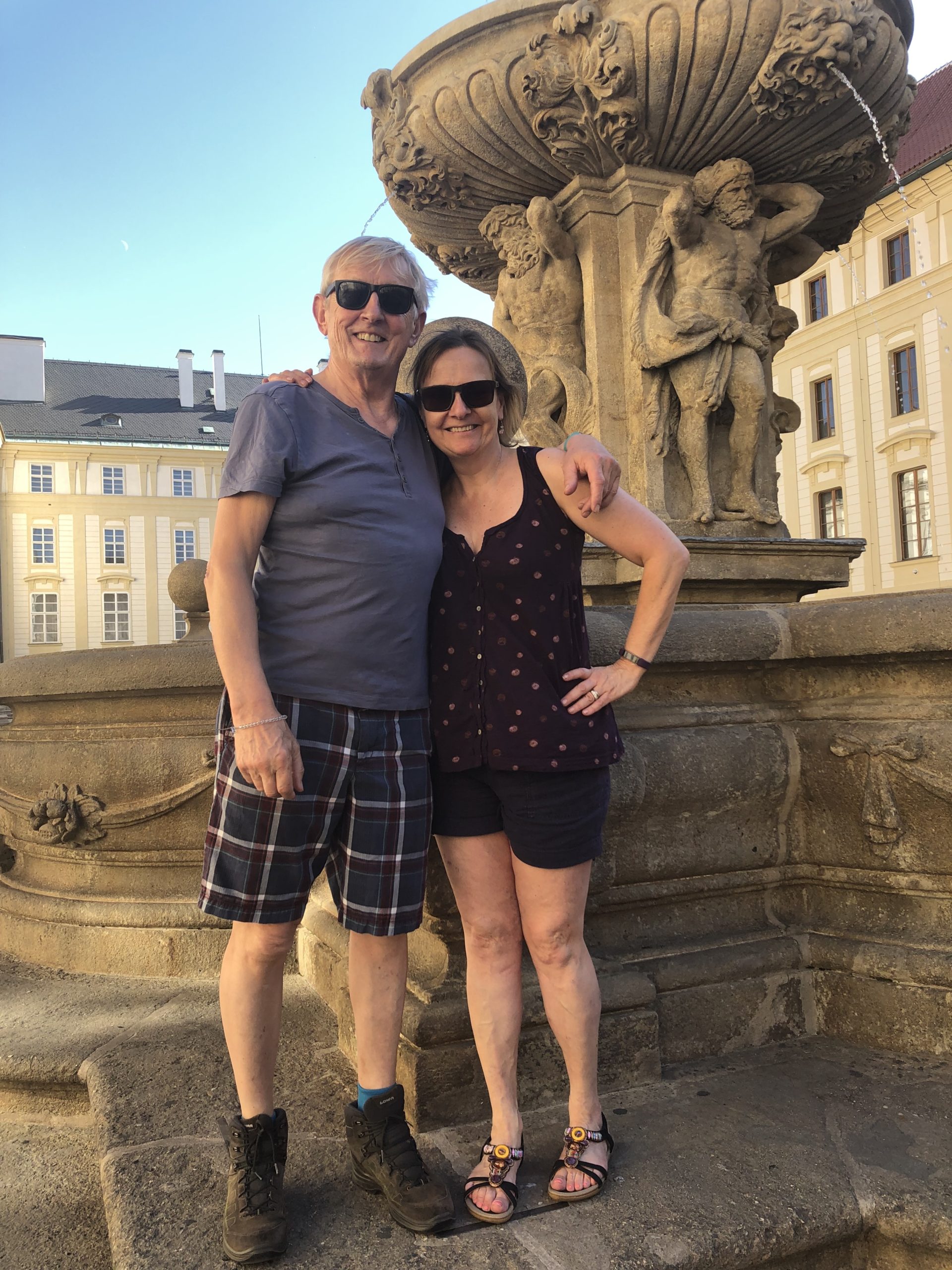Peter Welcome to our travel podcast.
Felice We want to share with you some of our extraordinary experiences and the amazing people we’ve met along the way.
Peter This week, the Royal Family is more in the news than ever, and we’re talking to Richard Kay, the London Daily Mail’s Editor-at-Large and an old friend of ours. For the past 40 years, Richard has been – and indeed continues to be – the expert on the changing of the guard at Buckingham Palace. Remarkably, he tells us how he became a close confidante of Princess Diana, building a private personal relationship with her that lasted for five years before her untimely death in Paris. It was to Richard that she made her last phone call on that terrible day.
These days, it’s not Charles versus Diana, it’s Harry versus William. The eternal Royal soap has reached a new level of drama, and Richard knows it all. So, Richard, we’re thrilled to have you on the show. Now you’re acknowledged as one of the greatest experts of all time on the Royal Family. Back in the day, you were the much acclaimed Royal Correspondent of the Daily Mail – the London Daily Mail, I should say – and you travelled the world to report on the comings and goings of the Royal Family, which never failed to make headlines then, as they do now. However did you get into a job like that?
Richard I think it was pure happenstance. From memory, I’d just come back from a fairly long stint in Northern Ireland covering the troubles in Belfast. I think I’d been there three years and my then editor thought that I could do with a change. It wasn’t quite the change I had been planning, but nevertheless an opportunity arose and he said, ‘I’d like you to do this for a while.’ I remember being at the time being reluctant because I quite liked the whole general news and the changing diet of stories and travelling a lot. But he said, ‘Never mind you’ll travel a lot with the Royals.’ I certainly have over the years and I sort of fell into it and I found myself very much at home very quickly.
They were an interesting bunch of journalists. They had a terrible reputation in the 1980s, but it was ill founded, really, because they were all first class reporters who all they wanted to do was to come up with stories about the Royals because they were the stories back then – and today it is still, I guess – which sold newspapers. And in those days, we’re talking vast quantities, when newspapers had huge circulations. You put a picture of Princess Diana on the front of the Daily Mail or your old paper, the Express, or any magazine, and they flew off the shelves.
I think it’s changed a lot over the years. I mean, we were never exactly warmly welcomed by the Royals when we travel with them. Tolerated, I think would be the kindest way to put it. The story has obviously changed a lot. For starters, I mean, in the 1980s when I was doing this to start with, principally we were only interested in the saga of Charles and Diana, the marriage, the unhappy marriage, and it sort of went on and on for years. They were the story within the story, if you like. I also travel with the Queen and other members of the Royal Family, but there was something about Charles and Diana which generated huge interest, especially the Princess, all around the world. People were just fascinated by everything to do with this story of the unhappy bride who seemed to be cold shouldered by this rather ruthless family.
Obviously, everything changed with the death of Diana in 1997 and the way that her sons, William and Harry, then began to take centre stage as they grew up and began lives of their own. But nevertheless, the influence of the Princess has coloured Royal reporting throughout the 25 years since her death, and she’s still remarked upon in most pieces. For example, just the other day her daughter-in-law, Kate, the new Princess of Wales, was wearing jewellery which once had been worn by Diana. So there are all these constant links to the past. That’s the thing about the Royal story – you’ve got all these links going back over the years as well. But in terms of covering the story, I think it has changed a lot now because it’s much more fast moving. In the old days when I was first doing it, sometimes if you were in a far-flung part of the world, it could take a day or so to get your story and your pictures back to London to be printed. These days it’s instantaneous.
Peter Yes, It’s a remarkable story. In those days, I can remember people actually using Morse code to get a story out. It sounds ridiculous in this day and age, but there used to be a thing called telex – which no one today knows what that is – and along the line all sorts of communications were tried, not quite carrier pigeons, but just about everything else. Carrier pigeons were used by the Daily Express in the end of World War Two, actually.
Richard Actually, I’m sure they were. I was covering the Gulf War, the first Gulf War in 1990 and 1991. Again, a bizarre story. I’d gone out there as a Royal correspondent with Prince Charles, who was going to see the troops and I got stuck in Saudi Arabia – and got stuck in a good way because it was very difficult to get correspondence in because they were being very tricky about visas. I was in country and my editor simply said, ‘You’ve got to stay.’
I’d packed for a weekend in a city; I suddenly found myself with the troops in the desert. And on that occasion it was extremely hard; there were no mobile phones then. There were also censors who were censoring copy. I found the best way to do it was to write what the soldiers called blue-ies. So air mail letters, and the service was really very good and I could I could write a letter. In fact, I could write a story and post as a letter to my editor – or the editors – back in London. It was one way of getting through.
Peter I’ve never heard of that one before. Probably took only a couple of days, did it?
Richard A couple of days, I think. A couple of days.
Peter So you find yourself as a hard news reporter suddenly doing this and then back to the Royals again afterwards.
Richard Yes, it was it was pretty much straight back to it. I mean, I thought I might have had a brief escape, but, you know, I found myself being lured back in. And of course, we’re talking 1991, which was really the zenith, if you like, of the troubles between Charles and Diana. They split up the following year. And, you know, one of our number, you’ll remember him, Andrew Morton, became a world-famous author on the back of his amazing story about Diana’s life. Suddenly, once again, the Royal story seemed irresistible and I sort of stuck with it pretty much ever since.
Peter You actually became good friends with Diana. You created a personal working relationship with her, which was quite remarkable. I think I’m right in saying the last phone call that she made on the night she died was, in fact, to you? First of all, how did you form this relationship with her? As you say, it was tricky – the Royals on one side, the press, international press, on the other. But you somehow managed to bridge this gap.
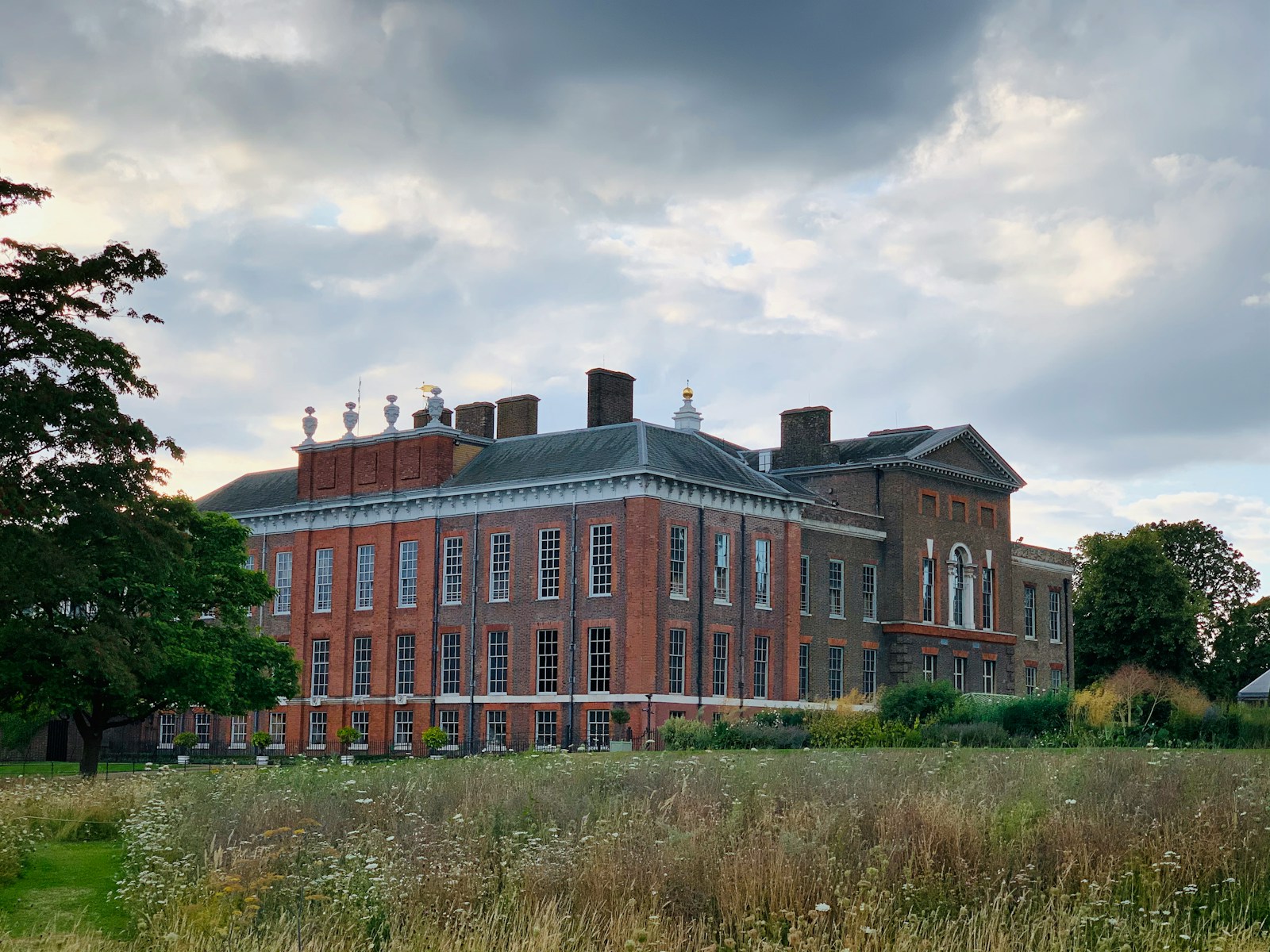
Kensington Palace. Photo: © Pranav Thombare/Unsplash
Richard I think the only way I can explain it, because I was slightly surprised at the time – more than surprised that she sought my friendship – was because I’d written a few sympathetic pieces about her in that period of 1991-92, and more than a few, quite a few, I guess. And, you know, our view, our editorial position was that she was the wronged woman, whatever the rights and wrongs of the story, that was….because it was a sound commercial position to take because our readers were.
Then one day I got a message, I think it was from one of her police bodyguards who said, ‘I gather, you know so-and-so,’ and it was somebody I knew. ‘Well, they’re very, very keen for you to go round one day later this week, because there’s someone that they want you to meet.’ And I found this all very odd. And why didn’t they ask me themselves, they know me?
Anyway, I duly turned up at this flat in Chelsea and I walked in and sure enough, these sort of acquaintances, rather than friends of mine, were there. But so too was the Princess of Wales. And the friends almost immediately scarpered and left me with the Princess, alone. And she said, ‘I’m really glad you came. I just wanted to thank you for some of the pieces you’ve written. You seem to have an idea what my life is like.’
You know, that was really how it started. And it obviously developed. I mean, I’m not naive. I mean, the reason obviously why she sought a friendship was with me was because of what I did and because of my job. She was clearly very interested in this obsession that Fleet Street newspapers and the media had with her, and she found it very hard to understand. And I you know, I did my best to explain it all to her. And really, it sort of sprung from that. We started communicating. You know, she gave me her private numbers; I gave her mine and one thing led to another. It was obviously tricky because once Buckingham Palace found out they would have taken a very dim view. In fact, I know that they did.
Also I thought it was probably not going to last very long. I remember thinking as well, this could be all over in a week or two, what do I do? Because we’d had quite a lengthy chat. ‘Should I go back and write everything down that she told me and write a story about it? Or should we play the long game?’ I said to myself. I chose to play the long game, which for me worked.
We became pretty close friends for the next five years, right up until the day of her death. Going on to that day, obviously, August 1997, I only know from the Scotland Yard investigation carried out by Sir John Stevens, Lord Stevens, as he now is. He says that they traced all the calls that she made from the Ritz Hotel the night of her death, and the very last call she made was to me. Humbling in a way, but incredibly sad. In another, we’d had a fairly humdrum conversation. She was clearly anxious to get home. She was obsessing a lot about the constant presence of the paparazzi – they barely left her alone all summer. And, you know, we talked about what she might do next, but it was the kind of a conversation that probably lasted 30 or 40 minutes, but it was a kind of, ‘well, we’ll pick it up tomorrow.’ I expected to see her the next day. And, you know, that was the last time I spoke to her.
Felice Going on to travel. Would you always travel wherever the Royals went? Which Royal in particular?
Richard Well, there was a priority list travelling with the Royals in the ’80s and ’90s. It really was Charles and Diana if they were – when they were – together and when they weren’t, it was Diana, then Charles, then the Queen and Prince Philip, and Fergie and Andrew when they were still together. Fergie, of course, on her own once she split up from Andrew. And very occasionally, if we were feeling particularly virtuous, we might take a trip with Princess Anne to go and look at something in Africa. Once or twice I went away with Edward. Obviously, it was before he was married.
Perhaps my oddest Royal to go away with was Princess Alexandra. I remember going to the middle of India, to Bhopal, which was the scene of that terrible chemical explosion in about 1984. As a consequence of that, a lot of people had lost their eyesight. Alexandra was patron of a charity that helped Third World people get spectacles and prescription lenses; it was an incredibly worthwhile charity to support. I found myself sent out there, again having been on holiday in Turkey and I was told to go from Turkey to Delhi, which was extremely difficult at that time without visas.
But anyway, I did eventually get there and I just went to the only hotel in Bhopal, and sure enough was where Alexandra and her late husband, Sir Angus Ogilvy, were staying. And they just said, ‘Well, you might as well travel with us.’ I sat in that car. I remember he was hopeless with a camera and I took lots of pictures of them. There was a zoo and they wanted some pictures to send back to their children looking at animals. And it made a piece of sorts. But it was a very interesting opportunity to get close up with someone one didn’t write about that often, but who is, after all, the granddaughter of a King, Emperor herself. King George V was her grand grandfather and she first cousin of the Queen. So it was it was interesting.
Felice How do Royal trips work for journalists? Do all the journalists stay in one place together?
Richard Yes. I mean, the Royals, the Royal staff, like to try and corral all the press together. They hate having people operating freelance. They want to make sure you’re all in the same pen. And for that they will organise, although we have to pay for it, local transport which is fixed up by the Embassy or the High Commission on the ground, and it means you’re transported on buses to all the positions where the Royals are going to be.
To be fair to the Royals, these trips are very much organised on the lines of what would make a good photo opportunity, where would be a good position for photographers to stand and for writers they would try and have something heavy for you to report on – like a speech or some sort of charity that was important to the Royal concerned. I mean, they’re all extremely worthy and I think they all got very frustrated, especially in those days when mostly the press were only interested in what Diana was wearing, who made it, whether she flashed her eyes at anybody, was she going to go for a swim, was she even talking to her husband? It was the narrative of the time.
Obviously, things have changed now, and the principal Royals, I guess, are now Kate and William, because they’re the glamour couple. It’ll be interesting to see what sort of numbers King Charles gets when he goes on his first overseas visit. I mean, I think he’s got a plan to go to Australia next year – that should be especially significant. I’m just not sure how popular he’s going to prove to be.
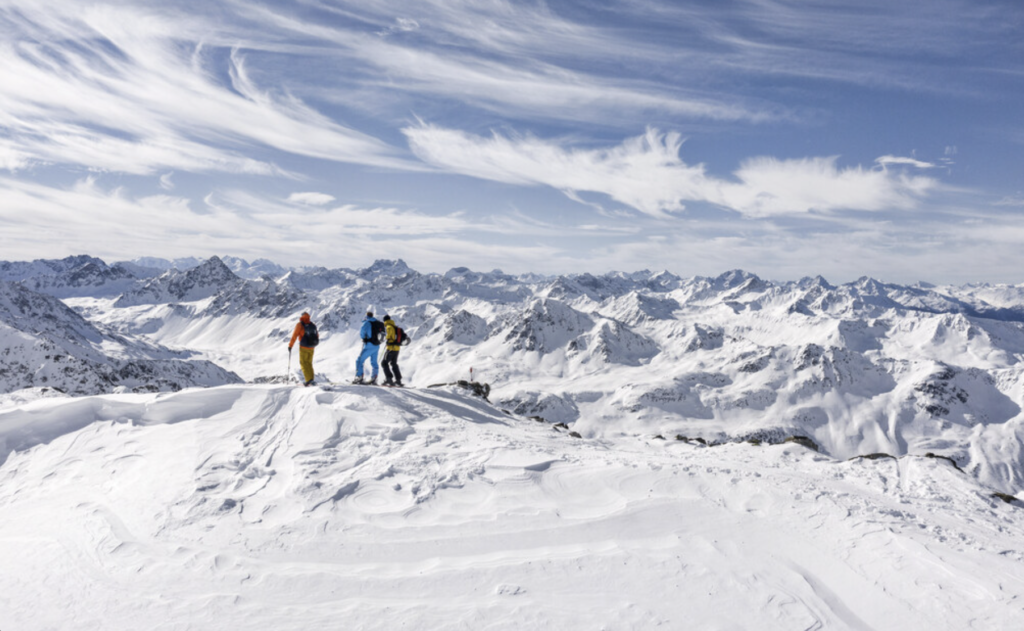
Off-piste skiing above Klosters. Photo: © TVB Davos-Klosters
Peter I think that’s very true. I remember actually both Felice and I meeting you in Klosters. I remember being with Felice in Klosters in Switzerland sometime probably in the early ’90s, and we met up by chance because you were, because the whole Royal charade was being played out there with Prince Charles. I can’t remember who he was with, but he was there. Of course there was set rules, weren’t there? You’d have a photo opportunity which was agreed and therefore you would leave them alone after that.
Richard That’s exactly it. I’m very grateful for Prince Charles’ love of Klosters because it introduced me to that part of Switzerland. I’ve become very fond of it over the years and have been many times. But that’s how it worked – you would go out, you’d fly out. Charles was out there usually for about seven or eight days, and there would be a photo call; he’d pose for a picture. And if it was with William and Harry, great. If it was him on his own, not so great. Of course, originally when I first did it, it was with Diana and there were masses of photographers there. Over the years it obviously changed a bit.
But because…Peter, you’ll remember this well, there was a terrible accident in March 1988. An avalanche struck the Royal party Charles was skiing with, and one of the equerries, in fact, an equerry to the Queen – a young father – was killed, one of Charles’ companions very badly injured. It really meant that from then on, we journalists had to go with Charles. I mean, Charles himself was probably within a whisker of being swept away by that avalanche that day, and the whole course of Royal history would have been changed.
So we went and he hated us being there. Of course, we tried not to spoil his skiing but, you know, one had to be around, one had to travel on the same mountains as he was on. And then later on that changed when William started skiing with his family and people were very interested to see them on the slopes.
Peter I remember during that trip to Klosters you’d had the photo opportunity and therefore all the journalists were going to leave him alone while he went skiing. It didn’t, of course, apply to us because we were nothing to do with the Royal party at all, so we thought we’d go skiing to see what Prince Charles was like as skier and we rode up in the cable-car with him. Then we skied down a suitably sensible distance from him. It meant we could overhear what he was saying in the cable-car, and I’d say it wasn’t a world exclusive. It was one of the most boring conversations I’ve ever heard in my entire life. Something to do with agriculture in Scotland. But we saw him ski.
Felice He was a good skier, actually.
Richard There was, of course, that very famous occasion just before his wedding to Camilla in 2005, when he was out in Klosters with William and a sort of a pre-wedding boys’ trip. He had a face like thunder the entire time. He didn’t want to pose for the photographers, but he did it because his press secretary said, ‘That’s a good idea, sir. And once they’ve got their pictures, they’ll clear off.’
We were introduced to the concept of the hot mic. Now the hot mic is where a microphone is inadvertently left on and you can hear the people speaking and everything that Charles said, thinking he was out of earshot of all of us and in fact, we were out of earshot of all of us. But the mic picked it up and he started running down the journalists. And one poor unfortunate chap in particular who worked for the BBC and the Prince was recorded saying: ‘That awful man. I can’t stand that man.’ And it made a very, very amusing piece. And of course, he was mortified by this, Nick Witchell, because it was he who is the BBC’s eminent and distinguished long-standing Royal correspondent, was mightily put out by this at the time, but grew to be rather proud of it. It was a sort of a badge of honour: ‘that awful man’.
Peter ‘That awful man’ has stuck with him forever.
Richard Yes.
Peter But your love of skiing…did it begin then or have you always skied?
Richard No, I’d skied badly. I learned to ski at school and I remember that we had ski trips. Then when I got to Fleet Street, I skied with Fleet Street friends and we would often go out as a group most Januarys for a rather rowdy week on the slopes. And then of course when the Royals came along, for me it was an opportunity to ski every year and sometimes more than once or twice, because the Duchess of York skis, that’s Fergie and Prince Andrew. And, you know, it was interesting to see them and what their abilities were. Fergie was a good skier. I know you two are both expert skiers and I’m not quite such a good skier, but you do begin to pass judgment on them, on their abilities. Charles was not a bad skier. Diana was a bit reckless but, perfectly ok but she didn’t like off-piste.
Peter Fergie is a good skier.
Felice Apart from skiing, do you have any other interests that you do outside work?
Richard Outside work? Well, I’ve got three children, although they’re not really at home anymore, although one’s come back home because she was at university and everybody’s coming back and they’ll never leave probably. So we have one – our eldest daughter is here currently. Work is still a major sort of part of my life. I’m still working full time at the Daily Mail. I still very much enjoy it and they seem to want me around and I’ll continue as long as both those things still exist. But outside that I like watching a bit of sport and apart from that, a bit of tennis in the summer. I cycle everywhere.
Felice And when you’re on your trips, Royal trips and other trips, what’s the worst thing that’s ever happened? Has anything gone really wrong or something happened unexpectedly?
Richard I’m sure things have gone wrong. It didn’t go quite as wrong as they did for one of my colleagues. It was back in Klosters at the time of the avalanche, and we knew something had happened. We had heard and seen clattering helicopters and then began to get a bit anxious. They were rescue helicopters and you know something’s up. Somewhere along the line, it was a beautiful spring day, in the afternoon we were told about the Royal party. So there was sort of widespread panic.
I remember being up the mountain with a few fellow skiers, and we decided to get down to the village because we thought that’s where we’d get any news. We raced down as fast as we could. I was with a colleague of mine who’s no longer with us, sadly, a man called James Whitaker, who worked for the Daily Mirror. And he jumped into his car and decided to go to the police station, but he was wearing ski boots and he engaged gear or drive – I think he had an automatic car – and he got his foot wedged under the brake pad and the accelerator, and he just drove straight into a wall and the police arrived and arrested him. He was carted off to Klosters police station and put in a cell and absolutely demanded that he be allowed to make one phone call. And he wasn’t to call a solicitor, it was to call his office in London and his news desk and we all helped him out. His wife was there, I remember, and we all ran little bits of information into the police station so that dear old James could file his story to London from the pokey.
Peter I remember that.
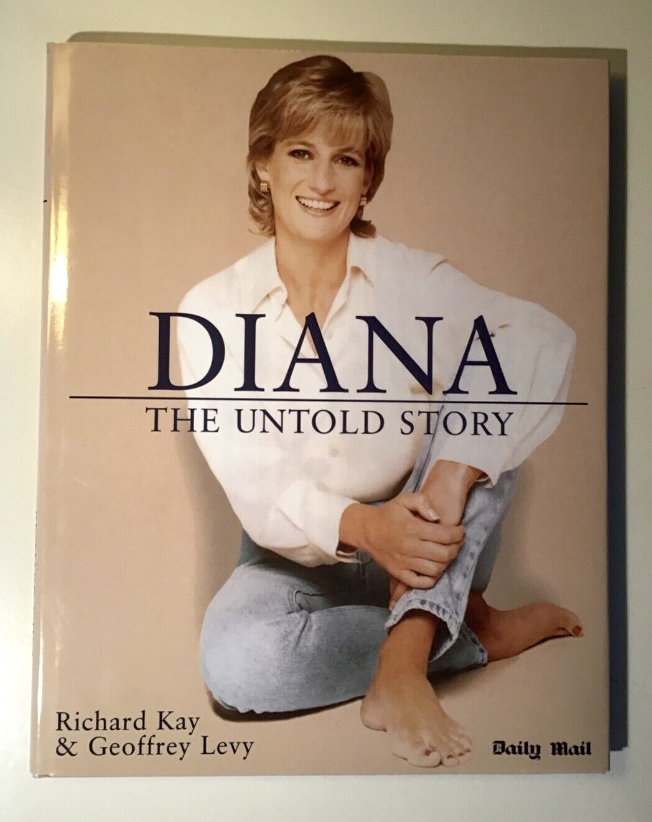
Felice You’ve written a couple of books, haven’t you? One about Diana and one about the Gulf War?
Richard Yes. I wouldn’t say there were major examples of literature. The book about Diana was really a collection of articles that the Mail decided to publish as a book, actually, for an American audience – so I don’t really count that. I didn’t go through a process of writing a book; they were about a dozen or so features I’d written. I did write a book about the Gulf War, and I think it was simply because of the rather bizarre experience of going from being the Royal correspondent to the war correspondent in a flash of an eye. It was more of a diary than anything else, but it was something to occupy my time.
Felice Do you think you might write a book about your life?
Richard Well, I might one day. I’ve been offered a lot of money over the years to write a sort of a memoir, but particularly a book inevitably about Diana. I always felt on that score that suggested to me that I was somehow squirrelling information away where really, as a journalist, Peter you’ll understand this… we’re in the disclosure business. And I always felt that whenever I got a story or I got information, I used it and wrote it. Yes, of course, I would have a perception of her and her view of things, and there were obviously things I knew that I didn’t write about all the time. And maybe one day I will, as a retirement project. But I have no immediate plans to do it, although it is very tempting when people offer you very large sums of money.
Peter You and I grew up in a world of journalism where the reporter was never the story. The story was the story…
Richard That’s absolutely true. I mean, I did become the story myself on a couple of occasions. I got famously photographed with Diana, and that really was quite an odd encounter because I found myself plastered all over the front page of The Sun newspaper, you know, one of Britain’s biggest papers, and pictures of me getting in and out of her car. And it was all done by the newspaper – designed to wound Diana. It suggested that she was being mischievous by complaining constantly about press harassment, and here she was cosying up to a to a journalist, albeit a rival, of course. And it was obviously done in the hope that it would damage my relationship with Diana. Happily, it didn’t.
Felice Do you think that Kate is the person that’s taken over from Diana?
Richard I think in many ways Kate has taken over from Diana. She’s obviously got the glamour; she wears clothes beautifully; she photographs extremely well – not quite as well as Diana – there is something missing. She doesn’t have that incredible back story which somehow intrigued so many people all over the world, were fascinated by Diana and identified with her. Kate’s not like that, she’s a much more enclosed person, I think. I think she’s also terrified of being likened to Diana, as is anyone, frankly. Why would you want to be the new Diana? Why can’t she be the first Kate? But the interesting thing, of course, is that both Harry and his brother are sort of cloaking themselves very much in their mother’s legacy. And, you know, they’re each trying to say, ‘well, I’m my mother’s son and this is what she would have done.’ And it is really interesting how much time they devote to this.
Peter And we can’t really have this conversation without bringing Prince Andrew into it. What’s your view?
Richard Oh, Prince Andrew, I feel very sorry for him. He’s a fool. He was idiotic in his choice of friendships, but it goes into very much what kind of man he is. He was and he remains a very entitled, self-important person whose importance actually has diminished and diminished over the years. Andrew never really got over the fact that he was the second son and not the first son. He may have been his mother’s favourite, but he was not his mother’s first. Although for a very long time he was understudy to Prince Charles as the heir-in-line, once Charles and Diana married and had their children, Andrew’s position and influence waned and was reduced. And he’s never really, really accepted that.
He tried to find a role for himself after leaving the Navy, and it may well have enriched him in some ways, because I think it probably did, but it introduced him to a sphere of very dodgy people. And he never really had the intelligence to work out who the chancers were, who he should avoid. If he was told he either took no notice or just overrode their views and did what he pleased. And that’s really the whole story of Andrew’s trials and tribulations; that’s why he’s in the mess that he is now: it’s all about judgement and his lack of it.
Peter And there’s no way back for him now?
Richard There is no way back for him. And in fact, it’s very interesting. Just this weekend, there’s a story that he’s having his police protection taken away from him, and to Andrew that matters enormously because it’s all about status. So several years ago, he fought a losing battle to try and keep the police presence protecting his two daughters. And his argument was that, you know, they’re blood, they’re Princesses of the Blood Royal, the only ones who are born Royal, they should have police protection. And they are the important members of the Royal Family.
Both the Royal Family and the Metropolitan Police chose to disagree, and now he’s finding that he, too, is no longer going to have that front rank status. I mean, he’s an ex- Royal. He doesn’t do any engagements. He’s had all his official functions stripped from him by his late mother. I feel desperately sorry for him because there is nowhere for him to go except onto some sort of road of redemption, and what does that mean? I guess I think he’s going to have to do some kind of charity work to try and win back some sort of public support. But it could take many years and whether he’s got the application or not, I’m not sure.
Felice Or whether any charity would want to be associated…
Richard Good point. Would any charity want him?
Peter I don’t think so. The Royal Family in ten years’ time, how do you see it?
Richard I think a lot hinges on how Charles is as a monarch. He clearly has big plans to change it, make it smaller, more fit for purpose, if you like, than it has been. And I think that is the only way to go. I think if he comes across as too much of a curmudgeon, I think it could be extremely difficult for William and Kate to pull it off. I mean, they are the monarchy’s hope, but I wouldn’t care to guess even now how, how many more generations there will be of a Royal Family in this country. I was talking to someone just the other day who said, God forbid, if anything went wrong with the William and Kate’s marriage, then the monarchy would almost certainly be doomed.
Felice With King Charles I think it’s really good that he’s so involved with the environment. And I feel strongly that he should have gone to Egypt and made his speech recently.
Richard Yes, I quite agree. He was for many years a sort of a lone voice on green and environmental issues. It’s now very mainstream. He hasn’t slackened off in his view about what he thinks we need to do about global warming. But it’s difficult for him as King because it can be perceived, and will be perceived as some sort of party political advantage. And I think he has to be enormously careful. But in view of his track record, I tend to agree with you. Would it have been that awful for him to have gone over to Egypt to make a speech? I don’t think so. I mean, everyone knows where he stands on the issue.
Felice I agree. The other thing I wanted to ask you is have you watched The Crown on television?
Richard I have watched The Crown on television. I have had professionally to watch it, but I’ve also had a sort of a personal interest to see if I made a flicker of an appearance in this current series. I don’t, although my name is written down on a piece of paper apparently somewhere. But yes, I am not quite so worked up about it as some of my colleagues who feel that it’s a travesty that people should be allowed to make films about living, breathing members of the Royal Family. I don’t see why on earth they shouldn’t. And it is fiction. Some people have got a little carried away by the fact that they think the ordinary viewer sees it as a documentary. I have to say that the makers of The Crown have tried to pull this off themselves. They’ve gone into great detail to get all the period detail right, the right clothes, the right cars, the right accents, etc., etc., and all the exquisite exterior shots. So they are trying to have it both ways. They’re trying to say, ‘No, this is really this is really accurate and really true.’ But then they say,’ But of course, it’s only based on the family.’
The conversations are all imaginary. I think most viewers can see that. I’ve been rather impressed with the actress playing Diana in this current series, Elizabeth Debicki. I think she really gets her. And I wrote a piece and I said, if I shut my eyes and listen to her, I almost thought it was Diana talking. No one quite gets her right, but I think she’s about being about the best that has.
I feel a bit sorry for poor old Dominic West, who’s playing Prince Charles, because he’s much too good looking. He was still Prince Charles, then the Prince of Wales. And he comes across as a rather warm and sympathetic creature when in fact, I don’t think the Prince was at that particular time. But by and large, it’s been good. I think my one complaint is that it’s joyless, they’re utterly miserable all the time. The Queen, who we know had the most delightful and warm smile, she is never seen smiling. She’s always played with a sort of rather pursed, buttoned-up mouth, and I think that’s a great shame.
Felice Yes. Actually, I like the actress who played her when she was young.
Richard She was outstanding. I think everybody loved that very first series because none of us can remember it. But as it’s moved through time and we’re now just around the corner of our own memories, I mean, we started off talking about the 1990s and skiing. I mean, that’s not very long ago really. We all remember what it was like. I did speak to a private secretary last week about it. He said, ‘Well, it’s not too bad, The Crown.’ He said, ‘Anyway, thank goodness they didn’t make it as bad as it really was.’ I mean, so you think, my God, it’s this is bad…and it could it was even worse than that. So we didn’t really know how much was going on behind closed doors, though.
Peter Richard, thank you very much indeed for appearing on the show today. It’s been a real pleasure having you. And we wish you the best of luck with your continued writing as Editor-at-Large for the Daily Mail.
Richard Thank you both.
Felice That’s all for now. If you’ve enjoyed the show, please share this episode with at least one other person! Do also subscribe on Spotify, i-Tunes or any of the many podcast providers – where you can give us a rating. You can subscribe on Spotify, Apple Podcasts or any of the many podcast platforms. You can also find us on Twitter, Facebook and Instagram. We’d love you to sign up for our regular emails to [email protected]. Until next week, stay safe.
See also: Ski Instructor To The Stars And Royals.
© Action Packed Travel

- Join over a hundred thousand podcasters already using Buzzsprout to get their message out to the world.
- Following the link lets Buzzsprout know we sent you, gets you a $20 Amazon gift card if you sign up for a paid plan, and helps support our show.
